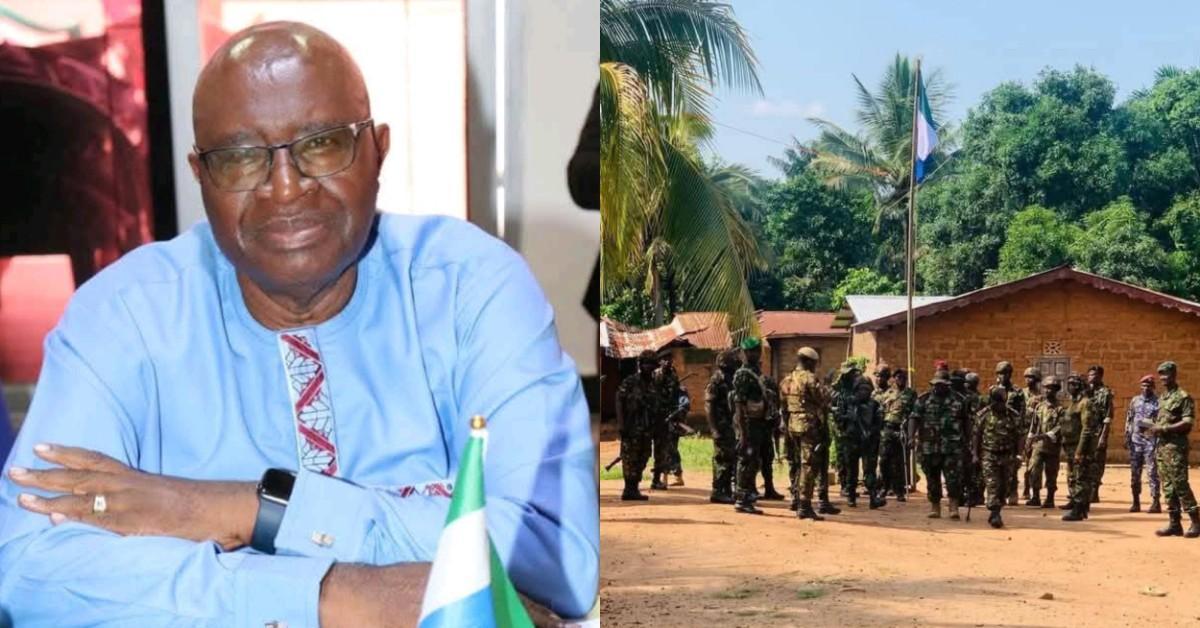Africa-Press – Sierra-Leone. Sierra Leone’s Minister of Internal Affairs, Morie Lengor, has made strong remarks about the ongoing tension between Sierra Leone and Guinea over the Yenga border area.
He stated that Sierra Leone is not looking for conflict, but the country is ready to protect its land if Guinea continues what he called aggressive actions.
“We want to ensure that the matter is resolved amicably, peacefully, and diplomatically because we’ve suffered the consequences of war, and nobody wants bloodshed,” he said.
Diplomacy has played a role in the Yenga issue for many years. In 1912, Britain and France agreed that Yenga belongs to Sierra Leone. That position was confirmed in agreements signed by late Presidents Ahmad Tejan Kabbah and Lansana Conté.
Later, in 2012, President Ernest Bai Koroma and President Alpha Condé met on May 1st in Liberia during the Mano River Union and signed an agreement again confirming that Yenga is part of Sierra Leone. On July 27, 2012, the agreement came into effect, requiring Guinean soldiers to leave Yenga while Sierra Leonean forces remained.
In 2020, Guinean soldiers were no longer in Yenga. However, based on available information, that same year President Alpha Condé began sending troops into Yenga again. They entered for short periods and later returned. By 2021 and 2022, after Mamady Doumbouya took power, Guinea began building permanent structures and military barracks in Yenga.
Morie Lengor confirmed that the government of Sierra Leone was aware of these developments, saying reports were made. He said the Guineans built the barracks behind their military line.
It was noted that if Sierra Leonean soldiers had remained present in Yenga, Guinean soldiers would not have had the opportunity to enter. Morie Lengor responded: “We in Sierra Leone are law-abiding people, and so there was that agreement. We’re honoring our part of the agreement as stated, because even the people who came said they want a demilitarised Yenga they don’t want Guinean forces or even Sierra Leone forces, no military at all.”
He said Sierra Leone’s military stayed where they were because they did not want to disturb local residents, adding that people generally do not want soldiers in their towns.
There have been growing concerns from the people of Yenga and nearby communities that Guinea may be targeting the Moa River and aiming to reach as far as Daru. Koindu is believed to be the next step, followed by parts of Kailahun and Daru, which some Guineans reportedly claim as their own. Meanwhile, Sierra Leone has continued to follow the diplomatic path, even as Guinea builds barracks within Sierra Leone territory.
Morie Lengor stated that Sierra Leone will not continue to sit and watch if the situation goes beyond control. “I definitely don’t think we will sit down and watch them pass Koindu and come beyond. We’ll defend ourselves rigorously,” he said.
He also said that there has been a lack of sincerity on the part of some Guinean forces on the ground and suggested the situation may be used to draw attention away from problems within Guinea, including pressure on its government to return to civilian rule.
“If they continue with this kind of situation, even their citizens will start thinking in a nationalist way like Sierra Leone wants to fight them,” he said.
He added that it is being used as a distraction not just politically, but also economically. He also pointed to reports of Sierra Leoneans being deported and mistreated in Guinea.
As a national figure, Morie Lengor called on everyone to take this issue seriously and remove politics from it. He said Guinea will not be able to reach Koindu because of the defensive position Sierra Leone has taken, and that at this point, the country has the right to defend itself.
He ended with a reflection: Guinea once helped Sierra Leone during the rebel war, but now the situation has changed. “It’s just like the story of a camel: you let the camel into your tent to take shelter, and at the end of the day, the camel kicks you out,” he said.
For More News And Analysis About Sierra-Leone Follow Africa-Press






